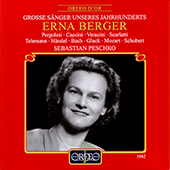
Giulio Caccini (1551 - 1618)
Born in Tivoli or Rome itself, the singer, lutenist and composer Giulio Caccini studied with Giovanni Animuccia and in the 1560s was taken to Florence by Cosimo I de Medici, who encouraged the further development of his abilities. He won a reputation as a singer and was associated with the early discussions of the Florentine Camerata that led to his use of the so-called stile recitativo, the style of singing that followed, as far as possible, the intonations of speech. Italian monody, accompanied by basso continuo, a chordal instrument and a bass instrument, was an important element in the newly developing form of opera.
Stage and Vocal Works
Caccini’s opera Euridice, the result of a collaboration in which Jacopo Peri wrote the greater part of the music, a setting of libretto by Rinuccini, was staged in Florence in 1600. He worked with other composers on Il rapimento di Cefalo, performed at the same celebrations for the marriage of Henri IV of France and Maria de Medici. In 1602 he published his Le nuove musiche, a collection of madrigals and songs, preceded by an essay on the new style of singing.
















